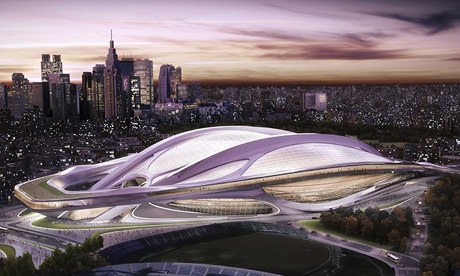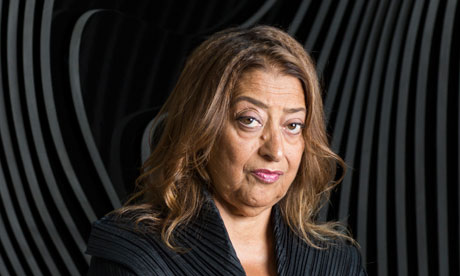Submitted by WA Contents
Zaha Hadid’s sport stadiums: ’Too big, too expensive, too much like a vagina’
United Kingdom Architecture News - Nov 29, 2013 - 12:32 7416 views
London-based Iraqi architect under fire as pressure mounts for designs in Qatar and Japan to be scaled back

The design for Qatar's Al-Wakrah stadium. Zaha Hadid says it is inspired by the sails of Arab dhows – others say it just looks like a vagina. Photograph: AECOM
One looks like a futuristic bicycle helmet, stretched across its Tokyo site in an aerodynamic sweep. The other has been said to resemble a vagina, rising out of the Qatari desert in a great vulvic bulge.
Both are in fact sinuous sporting stadiums by the London-based Iraqi architect Zaha Hadid, who is facing calls for her exuberant designs to be scaled back.
This week Japanese sports officials finally bowed to growing criticism thatHadid's scheme for the Tokyo 2020 Olympic stadium was too big and too expensive, saying they would shrink the design by a quarter.
The 80,000-seat venue, planned for the site of the current 48,000-seat national stadium, built in 1958, is described by Hadid as "light and cohesive", its structure forming a dynamic bridge that "creates an exciting new journey for visitors".
But the design has been met with fury by Japanese architects, who have complained that it is grossly insensitive to its context, looming 70 metres above the area of low-rise buildings and parks in the west of the city, close to the Meiji shrine, where a 15-metre height limit is in force.
The 100-strong group, led by Pritzker prize winner Fumihiko Maki, 85,filed a petition against the project earlier this month, protesting that the stadium was two to three times the size of its equivalents in London and Athens, and more than three times their cost, at 300bn yen (£1.8bn).

Japanese architects have complained that Zaha Hadid's design for the Tokyo 2020 Olympic stadium is grossly insensitive to its context. Photograph: AP
In response to mounting pressure, the Japan Sport Council has now announced it will scale back the floor space by a quarter to 220,000 sq metres, and reduce the budget to 180bn yen – still nearly 40% higher than the government's initial estimates for a new stadium.
With its ambitious scale, the project has echoes of Hadid's plans for theLondon 2012 aquatics centre, which were originally intended to be two such buildings, twice the size, rippling along the edge of the Olympic park like a pair of stingrays. But the realities of a budget got in the way and the scheme was cut in half.
The Tokyo news comes as Hadid has been forced to bat off claims that her design for Qatar's Al-Wakrah stadium, for the 2022 football World Cup, is based on the female genitalia, after images of the "vagina stadium" went viral last week.
The architect insists that the building's swollen flaps, which part along the roof to frame a central ovoid opening, were inspired by the sails of local dhow sailing boats, but others have ridiculed their labial similarities.
The Daily Show ran images of the stadium sprouting a forest of pubic hair, describing Hadid as "the Georgia O'Keeffe of things you can walk inside" and sent its sports correspondent to find the clitoral "press box" in vain.
As the feminist website Jezebel put it: "Any discerning human will be quick to recognise that the building looks exactly like an enormous vagina."

Zaha Hadid has been forced to bat off claims that her design for Qatar’s Al-Wakrah stadium is based on the female genitalia. Photograph: David Levene for the Guardian
Response has been muted in Doha, where Jean Nouvel's tampon-shaped tower already graces the skyline, but it is unlikely the country's more hardline neighbours will be amused.
In 2011, a cleric in Saudi Arabia, Sheikh Muhammad al-Shahrani, railed against plans for the new King Abdulaziz international airport near Jeddah, accusing a "western conspiracy" of making the building in the shape of a woman's prostrate body, with a phallic control tower looming above, below which "the movement of the aircraft is similar to the trajectory of sperm".
Hadid has little time for such lewd comparisons.
"It's really embarrassing that they come up with nonsense like this," she told Time this week. "What are they saying? Everything with a hole in it is a vagina? That's ridiculous."
Potted profile
Queen of the curve and conjuror of otherworldly forms, Dame Zaha Hadid has become a sought-after global brand, dotting the world with her rippling white structures, from Abu Dhabi to Azerbaijan. She has turned her hand to everything from swirling urban plans and challenging footwear, to jagged jewellery and garish superyachts. But success hasn't always come easy.
Born in Baghdad in 1950, Hadid studied mathematics in Beirut, before training as an architect at the Architectural Association in London. Long dismissed as an dreamy "paper architect", her early work grew out of dynamic paintings of skewed perspectives and fractured geometries, inspired by the fragmented forms of Russian constructivism. Her first building was a small fire station in Germany, built in 1994, whose tilting walls and angled stairs proved too much for the firefighters to stand.
Almost a decade later it was still her only building, yet since the mid-2000s commissions have flooded in, from the BMW headquarters in Leipzig to the Guanzhou Opera House in China.
Hadid was first woman to win the Pritzker prize (architecture's Nobel) in 2004, and is two-time winner of the RIBA Stirling Prize, for the Maxxi art centre in Rome and the Evelyn Grace Academy in London. Her 400 staff are working on projects in more than 40 countries – including the central bank and new parliament in Iraq
by Oliver Wainwright
> via TheGuardian
